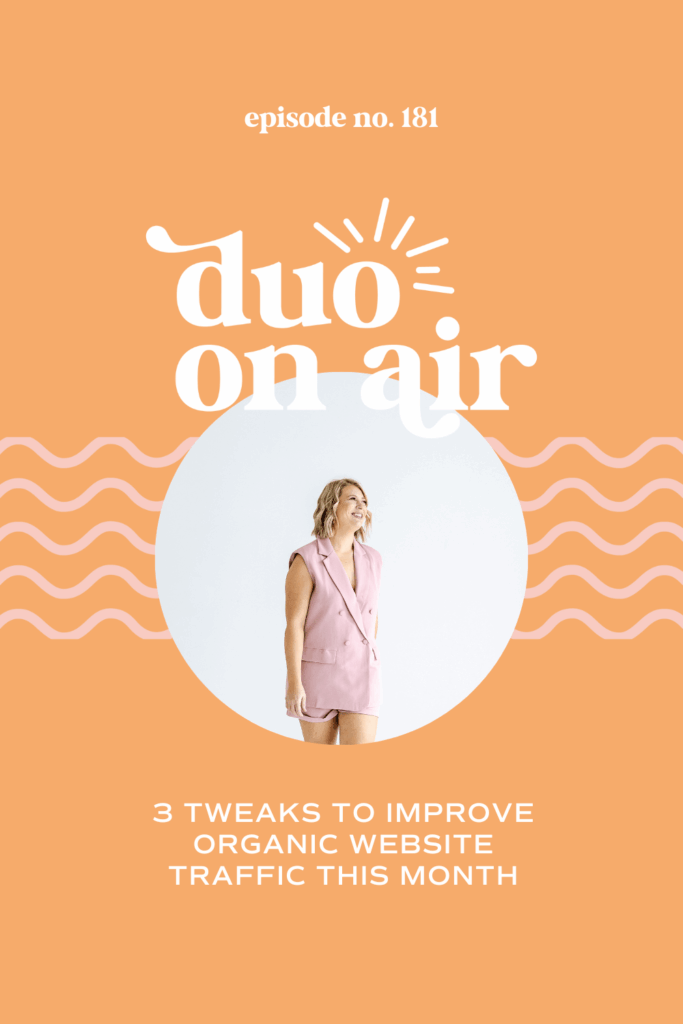What if we told you there are three things you could do this coming month—yes, in the next 30 days—that could improve organic website traffic?
You don’t need a massive website overhaul to start seeing results. Small, strategic adjustments can make a big difference.
#1. Create A Listicle for a High Volume Keyword
What does this mean?
Episode #121 breaks down all things on SEO keywords and how to choose the best one. We won’t get into these details today, so hit pause, run over there, and come back… cool?
If you are already familiar with keyword volumes and research, then we want you to find a high-volume keyword with medium to low competition. We’re talking in the thousands of monthly search volumes.
Now, what’s a listicle?
A listicle is a blog post that’s structured as a list. People love to read listicles because they’re easy to read and skim.
Here are some examples of listicles:
- 9 Email Newsletter Ideas That Look as Good as They Convert
- 3 Website Pages That Deserve More Love
- 3 Things to Know Before Your First Hire
- 13 SEO Tools Every Small Business Needs
- 14 Creative Ways to Integrate Video Tools Into Your Service-Based Business
- 9 Must-Have Branding Tools To Elevate Your Business
- 5 Things To Do for SEO If You Are Launching a Website Soon
- 7 Reasons Why Paid SEO Doesn’t Work
Remember: The magic isn’t just “making a list”— it’s tying it back to a keyword your ideal audience is actually searching for.
Why does this work?
People (and AI overviews) loveeee lists—70% of listicles tested in a headlines analysis had an increase in CTR than other post types.
They tend to get more traffic rather than a simple answer to “what is this” or “how do I do xyz.” Those queries tend to have more zero clicks because AI just gives them the answer.
If you Google “what is keyword density,” AI spits out a quick answer, and you probably never click because you get the information you need right there. But if you Google “10 tips to improve keyword density,” now you’re curious—and you’re much more likely to click through to learn more.
This topic is going to be a whole new module in SEO on Tap!
Tweak #2: Add Internal Links
This is linking from one page or blog to another on your site. Think of internal links as road signs guiding traffic elsewhere. They help your readers and Google understand how your site connects, and it helps Google find new content.
How to do it: Pick a blog that’s already performing well—Go to Google Search Console and look at what pages are performing the best in the last 3-6 months. Add 2–3 new internal links inside that best-performing blog to your service page, a sales page, or another blog you want Google to notice.
Including Instagram posts in your blogs can also be relevant now that Instagram is indexable. We talk about this in episode #180.
Tweak #3: Share Your Blogs Everywhere
Applying SEO best practices will improve organic website traffic, but you also have to put in some work and share your content with your audience.
- Post a link in your Instagram Stories
- Share it on Pinterest
- Send out an email round-up of blogs people need to read right now
- Share a resource in a Facebook Group for relevant questions
Warning: Google has said repeatedly that traffic itself isn’t a ranking factor. They don’t look at your analytics numbers and say, “Wow, lots of people from Instagram → let’s bump this page to #1.”
BUT, traffic from other sources can indirectly influence SEO.
Here’s how it works:
If people land on your site (from social, email, etc.) and then stick around, click around, and engage, that sends positive signals to Google, such as a low bounce rate and longer dwell time. Google does measure this. Google doesn’t see all your data, but it does see user interaction from Chrome, Android, and search itself.
Sharing your blog everywhere increases the odds that someone will link to it. And backlinks are a strong ranking factor.
The more people see your content, the more likely they are to Google your brand name later. Branded searches are a huge trust signal to Google.
Traffic from different channels can trigger Google to crawl your page sooner. If lots of people suddenly hit a new URL, Google notices and wants to check it out for themselves.
The more you share your content, the more chances you have to build the signals Google does care about—like backlinks, engagement, and branded searches. That’s why driving traffic from other platforms is still so valuable, even if Google isn’t literally counting every click from Instagram or email.
The best part?
None of these requires hours of work or advanced tech skills.
Which Tweak Are You Doing First?
Just pick one this week, do it, and watch what happens.
And if you’re sitting there thinking, ‘I love these quick wins but I want a full roadmap,’ that’s exactly what SEO On Tap is here for. It’s full of simple, doable steps like these that compound into real traffic growth.
Reminder: This is the last week to join us in SEO on Tap and snag those extra bonuses!
FAQs About Business Growth Strategies
Yes, SEO improves organic website traffic. When your pages rank higher for relevant keywords, more people find your site naturally (without paid ads).
It involves a lot of steps that we go over in detail in SEO on Tap. In short, you need high-quality keywords, on-page SEO, valuable content, quick load times, backlinks, technical SEO, and internal links.
There’s no one-size-fits-all answer. It depends on your industry, business goals, and current site size and volume. As a benchmark, small businesses should shoot for 1,000 clicks a month from search engines. Growing businesses typically have up to 10,000 clicks a month, and enterprise businesses usually see 50,000 clicks a month.
Tune into the episode!
Apple Podcasts | Spotify
If you liked today’s episode on The Duo On Air Marketing Podcast, don’t forget to leave us a review & subscribe!

More From The Duo
Sign Up for Tuesday Tips and Sips Newsletter
Abbey Oslin and Courtney Petersen are Minnesota-based marketing experts, educators, and co-founders of boutique marketing agency Duo Collective, which specializes in SEO, social media strategy, and branding for small business owners and creative entrepreneurs. To learn more about Duo Collective, or to inquire about working with our team, head over to www.duocollective.com.
To inquire about being a guest on Duo On Air, please fill out this application form.


+ show Comments
- Hide Comments
add a comment